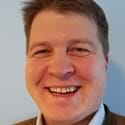Since 2003, Friedrich Haase’s farm has grown from 100 hectares to a 4,100-hectare business with 24 full-time employees. Haase, who bought the land because of its low agricultural value, has shown what can be accomplished through good management.
One of his key achievements has been to improve soil health by using elements such as nutrient cycling, water retention and regular soil testing. He also invested strategically in on-farm grain storage facilities, which allow him to both market his own grain and rent space to the local mill.
Key areas of sustainable practice
Friedrich purchased land in this specific area of Latvia because of the low agricultural land values. Land prices in this region have been adversely affected by limited financial investment, inadequate infrastructure and weak management, which have resulted in a loss of soil productivity and quality, such as poor field drainage maintenance leading to water logged soils.
To help improve the soil health and structure, the farm has introduced a number of practices to increase soil organic matter (SOM) levels and improve the positive effect this has on several elements of the soil’s properties, such as nutrient cycling, biological activity and water retention. Crop residues such as cereal straw and cover crops are incorporated into soils to increase the available organic material and cultivations are undertaken to minimize SOM losses.
The farm carries out regular soil testing for phosphate, potash and pH levels which are recorded on digital field maps. This data provides the necessary information to the fertilizer spreader, which is GPS equipped, to allow variable application rates across a field to meet targeted soil nutrient levels. This system is helping to apply inputs more precisely and to balance the soil nutrient profiles across each field.
To optimize nitrogen fertilizer applications with the aim of reducing quantities needed to maintain yields, the farm has implemented practices and technology that include:
- Using an N-Sensor that automatically adjusts nitrogen applications based on crop demands.
- Planting nitrogen-fixing crops to improve soil nitrogen levels.
- Trialing the application of nitrogen-fixing bacteria to the soil.
Generally, farms in Latvia operate through a system of grain traders and cooperatives that provide both grain storage and drying facilities and ultimately market the grain. To optimize the business and farm management, Friedrich has invested in 12,000 tons of on-farm grain storage facilities and a grain dryer. This has also provided him with the flexibility to market and sell his own grain and the opportunity to develop grain contracts with the local mill.
The grain dryers purchased by Friedrich have been specifically selected to utilize wood chip to generate the heat required to dry the grain. This wood is collected and sourced from around the farm and provides a sustainable and renewable source of fuel for grain drying.
Learn more about Friedrich Haase’s story
Explore the case study, where you’ll find extra details on how the farm has performed against the program’s good practice standards and criteria, what external research reveals about the producer’s actions and how improved sustainability benefits them.

“I always wanted to run my own farm, but in Germany this was not possible due to the cost of land. This is what led me to Latvia and here I saw the great opportunities available. I started with 100 hectares in 2003 and have since invested in more land and the farm’s infrastructure to help build and develop a sustainable farming business of over 4,000 hectares. I have learned a great deal and appreciate the benefit of understanding and collaborating with our customers. In 2008, we formed a partnership with Tartu Veski mill to grow wheat on contract for them; this has been a very successful venture and brought us in contact with McDonald’s.
When we were selected to become a McDonald’s Flagship Farmer it was a very proud moment as I feel this is recognition for the hard work of my staff and me and the partnership with Dobele and McDonald’s.”
“There are many barriers and challenges to establishing and building a successful farming operation, Friedrich has achieved something only a few would dare to consider. He moved from his native Germany and purchased 100 hectares of land in 2003. He has built this over the intervening years to more than 4,000 hectares. Friedrich is clearly a great businessman and farmer, who cares passionately about the farm and the local environment. His greatest achievement is that he has overseen and driven the transformation of poor arable land into a productive and sustainable farming operation.”


